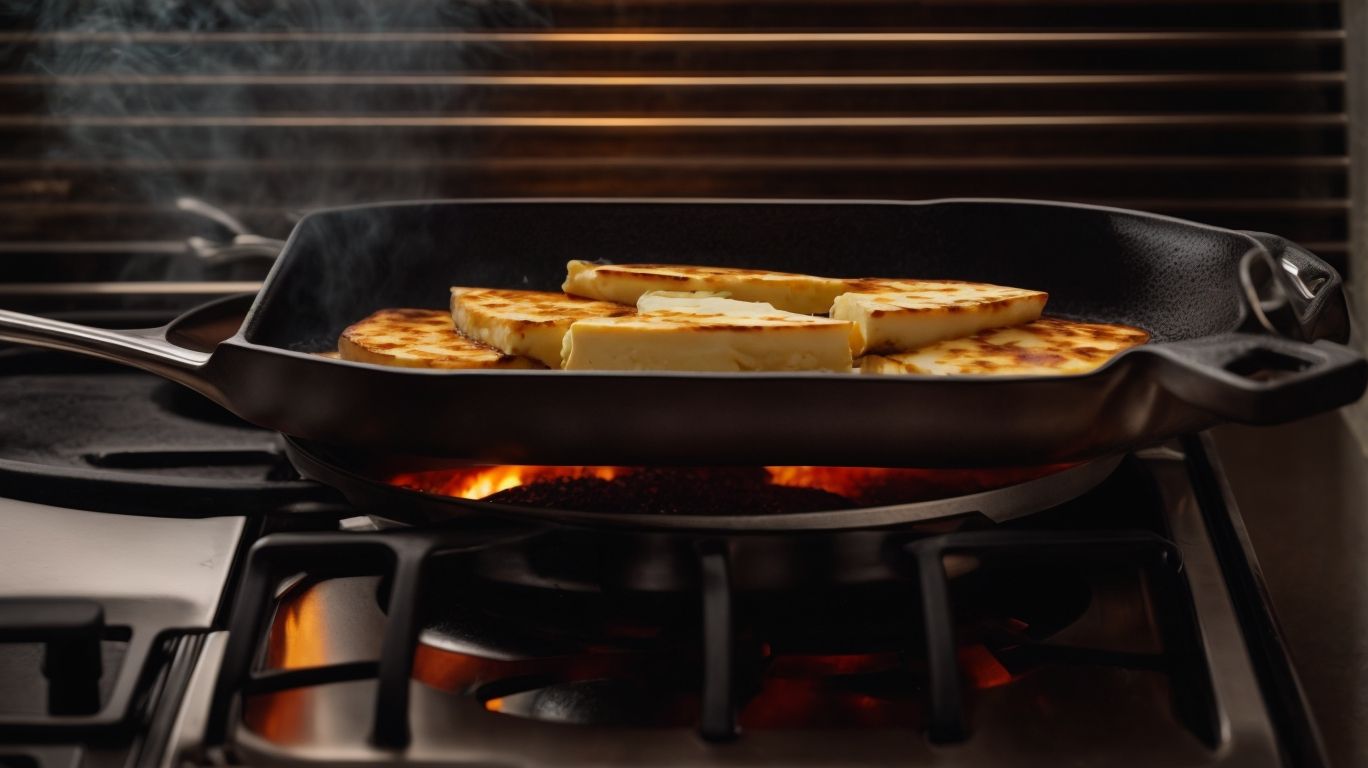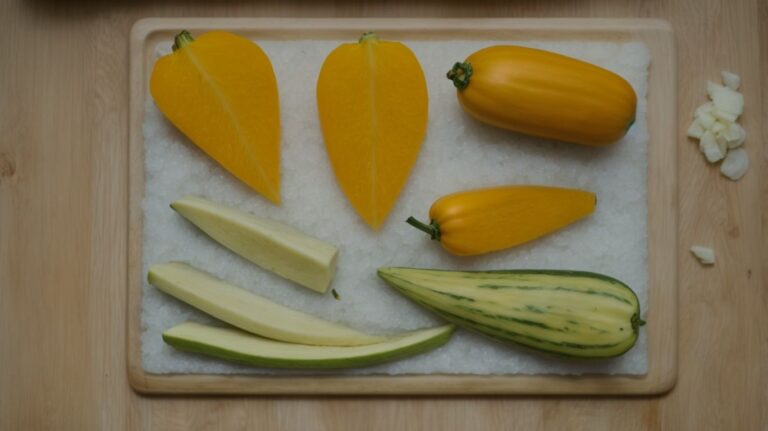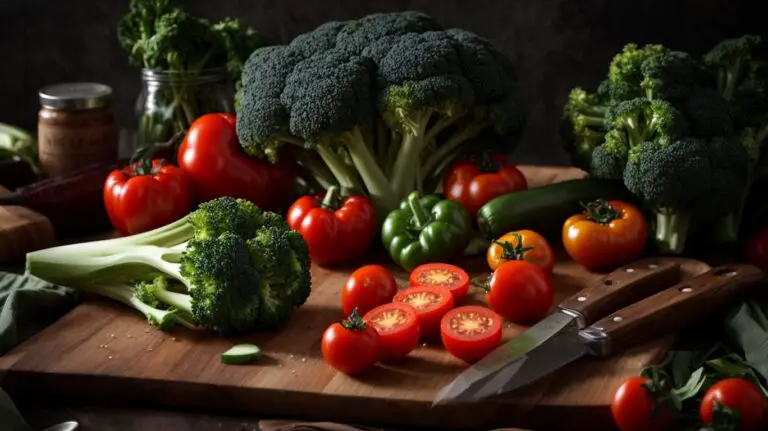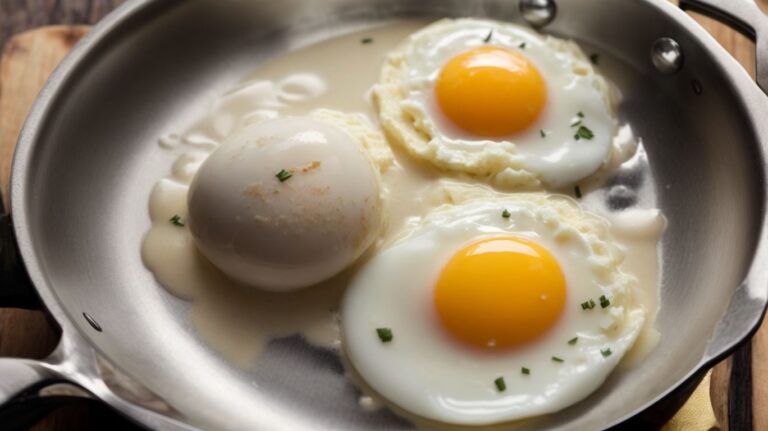How to Cook Halloumi?
Halloumi cheese, a beloved Mediterranean delicacy, is a versatile and flavorful cheese that has gained popularity worldwide.
We explore the origins of halloumi cheese, its unique texture, and its nutritional benefits. Additionally, we discuss how to choose the best halloumi cheese, store it properly, cook it to perfection, and serve it in creative and delicious ways.
Elevate your culinary skills with the deliciousness of halloumi cheese!
Key Takeaways:
About Halloumi Cheese
Halloumi cheese, a popular Mediterranean delight, originates from the island of Cyprus and is renowned for its unique texture and nutritional benefits.
Specifically crafted from a blend of sheep’s and goat’s milk, halloumi boasts a distinctive squeaky bite and a high melting point, making it ideal for grilling or frying. This cheese can add a salty and savory flavor to any dish due to its saltiness. Halloumi is protein-rich, calcium-packed, and low in carbohydrates, making it a nutritious option for those seeking a balanced diet. Its versatility extends beyond savory dishes, as it can be paired with sweet ingredients for a delightful contrast in flavors.
What Is Halloumi Cheese?
Halloumi cheese is a versatile dairy product known for its unique properties such as a rubbery texture and a high melting point, making it ideal for various culinary applications.
Originating from the Mediterranean region, halloumi is traditionally made from a mixture of cow’s milk and sheep’s milk, giving it a distinct flavor profile.
What sets halloumi apart is its ability to hold its shape when grilled or pan-fried, creating a crispy exterior while maintaining a soft interior. This characteristic makes it a popular choice for skewers, salads, or even as a meat substitute in sandwiches. Its resilient texture allows it to be easily marinated, absorbing flavors that enhance its taste.
Where Does Halloumi Cheese Come From?
Halloumi cheese hails from the picturesque island of Cyprus, traditionally crafted from a blend of sheep’s, goat’s, and cow’s milk, reflecting the rich dairy heritage of the region.
This unique blend of milks creates the distinct flavor and texture halloumi is known for internationally. The sheep’s milk adds a rich depth, the goat’s milk provides a slight tanginess, while the cow’s milk brings a creamy smoothness. The process of crafting halloumi involves curdling the milk with rennet before heating and shaping it into the iconic rectangular blocks. Once formed, the cheese is typically brined to enhance its salty flavor, making it a versatile cheese ideal for grilling or frying.
What Is the Texture of Halloumi Cheese?
The texture of halloumi cheese is characterized by a crispy golden-brown exterior that encapsulates a delectably chewy and savory interior, offering a delightful sensory experience.
When halloumi cheese is pan-fried or grilled, the exterior transforms into a crispy shell that boasts a tantalizing crunch with each bite. Its golden-brown coloration signals the perfect balance between caramelization and a buttery finish. This exterior not only adds a visual appeal but also contributes to the layers of textures that unfold with every mouthful. The inner core, with its trademark chewiness, provides a satisfying resistance that complements the outer crispness, creating a harmonious contrast that keeps taste buds intrigued. Halloumi’s unique sensory appeal lies in this beautiful dance between crunch and chew, making it a truly beloved cheese for those seeking a multi-dimensional gastronomic experience.
What Are the Nutritional Benefits of Halloumi Cheese?
Halloumi cheese presents a dichotomy in its nutritional profile, offering a mix of healthy components like proteins and calcium, alongside less desirable aspects such as higher sodium content.
Proteins are essential for building and repairing body tissues, making halloumi a good option for those looking to increase their protein intake without meat. Calcium, another key nutrient found in halloumi, plays a crucial role in maintaining strong bones and teeth.
The downside lies in its sodium content, which can be concerning for individuals with hypertension or those watching their salt intake. Excessive sodium consumption is linked to various health issues, including high blood pressure and heart disease.
How to Choose the Best Halloumi Cheese?
Selecting the finest halloumi cheese involves considering factors like origin, texture, and saltiness, ensuring an authentic Mediterranean experience straight from the heart of Cyprus.
In terms of origin, Cyprus is renowned for producing some of the best halloumi cheese in the world due to its traditional production methods and high-quality milk.
The texture of halloumi can vary from softer varieties that melt in your mouth to firmer selections that hold their shape during grilling or frying.
Consider your preferred saltiness levels as well, as some cheeses have a more intense saltiness that adds a punch of flavor, while others maintain a milder taste profile suitable for various recipes.
What to Look for When Buying Halloumi Cheese?
When purchasing halloumi cheese, opt for fresh slices with a slight grill or fry, enhancing their flavors with a drizzle of quality olive oil for an exquisite taste sensation.
Ensuring the halloumi is fresh is crucial as it impacts its texture and taste. Look for slices that have a slightly elastic texture when gently pressed between your fingers.
For cooking, grilling or frying are the preferred methods to bring out the cheese’s delicious savory notes while creating a crispy exterior and a soft, gooey interior.
Adding a drizzle of high-quality olive oil not only enhances the overall taste but also helps in achieving a beautiful golden-brown crust when frying or grilling.
How to Store Halloumi Cheese?
Properly storing halloumi cheese involves shielding it from direct heat and maintaining it at room temperature to preserve its texture and flavor integrity over time.
Ensuring that halloumi is kept away from heat sources like ovens or stovetops is crucial in preventing it from turning rubbery or losing its unique squeaky texture. Room temperature storage helps the cheese maintain its firmness and prevents it from drying out. It’s recommended to store halloumi in its original packaging or in an airtight container with a brine solution to keep it fresh for longer periods. Avoid exposing halloumi to fluctuating temperatures to ensure consistent quality and flavor.
How to Cook Halloumi Cheese?
Mastering the art of cooking halloumi cheese opens up a world of culinary possibilities, whether sizzling it on the BBQ or relishing a classic grilled cheese creation.
Halloumi, a semi-hard cheese renowned for its unique texture and salty flavor, is a versatile ingredient that can be utilized in a multitude of ways.
In terms of BBQ techniques, grilling halloumi over direct heat gives it a delightful charred crust while maintaining a gooey interior. For grilled cheese recipes, combining this cheese with fresh herbs, tomatoes, or even a drizzle of honey elevates the dish to new heights of deliciousness. The key lies in achieving the perfect balance of crispy exterior and soft, melted interior when cooking halloumi.
What Are the Different Ways to Cook Halloumi Cheese?
Cooking halloumi cheese offers a spectrum of possibilities, from grilling to frying, each method infusing the cheese with a distinct texture and flavor profile through controlled heating techniques.
Grilling halloumi cheese is a popular method that enhances its natural salty flavor and results in a crispy exterior while maintaining a soft, creamy interior. To grill halloumi, preheat the grill to medium-high heat, brush the cheese slices with olive oil, and grill them for 2-3 minutes on each side. The heat caramelizes the cheese, giving it a lovely charred taste.
On the other hand, frying halloumi creates a golden brown crust, adding a crunchy contrast to the soft cheese. For frying, heat a skillet over medium heat, add a thin layer of oil, and fry the cheese for about 1-2 minutes per side until it becomes golden and crispy. The frying process intensifies the flavors and gives the cheese a rich, indulgent texture.
What Are Some Tips for Cooking Halloumi Cheese?
Enhance your halloumi cheese cooking prowess by using a hot pan, achieving the perfect sear on each side, and enjoying the delectable results immediately for a delicious dining experience.
To ensure your halloumi achieves that coveted golden-brown crust, preheat your pan over medium-high heat. A searingly hot pan ensures that the cheese caramelizes beautifully without melting too quickly. Pat dry the halloumi before placing it in the pan; this helps in achieving a better sear.
When it’s time to flip the cheese, resist the urge to do so too soon. Let it develop that flavorful crust on one side before turning it over. Remember that halloumi cooks quickly, so keep a close eye on it to prevent overcooking.
For the best dining experience, serve the halloumi immediately after cooking. Its texture is at its peak when hot and freshly cooked, offering that irresistible combination of crispy exterior and soft, gooey interior. Pair it with a refreshing salad or some crusty bread to complement its savory goodness.
What Are Some Delicious Recipes Using Halloumi Cheese?
Indulge in a culinary adventure with tantalizing halloumi cheese recipes that capture the essence of the Mediterranean, showcasing its salty flavor in a variety of mouthwatering dishes.
Whether grilled to a perfect golden brown crispness, or incorporated into vibrant salads bursting with freshness, halloumi cheese adds a unique texture and savory kick to any meal.
Imagine savoring a summer feast with charred halloumi skewers alongside juicy tomatoes and fragrant herbs, or treating yourself to crispy halloumi fries paired with a zesty dip.
The versatility of this cheese shines through in both traditional Mediterranean fare and innovative fusion creations, making it a go-to ingredient for those seeking bold flavors and culinary creativity.
How to Serve Halloumi Cheese?
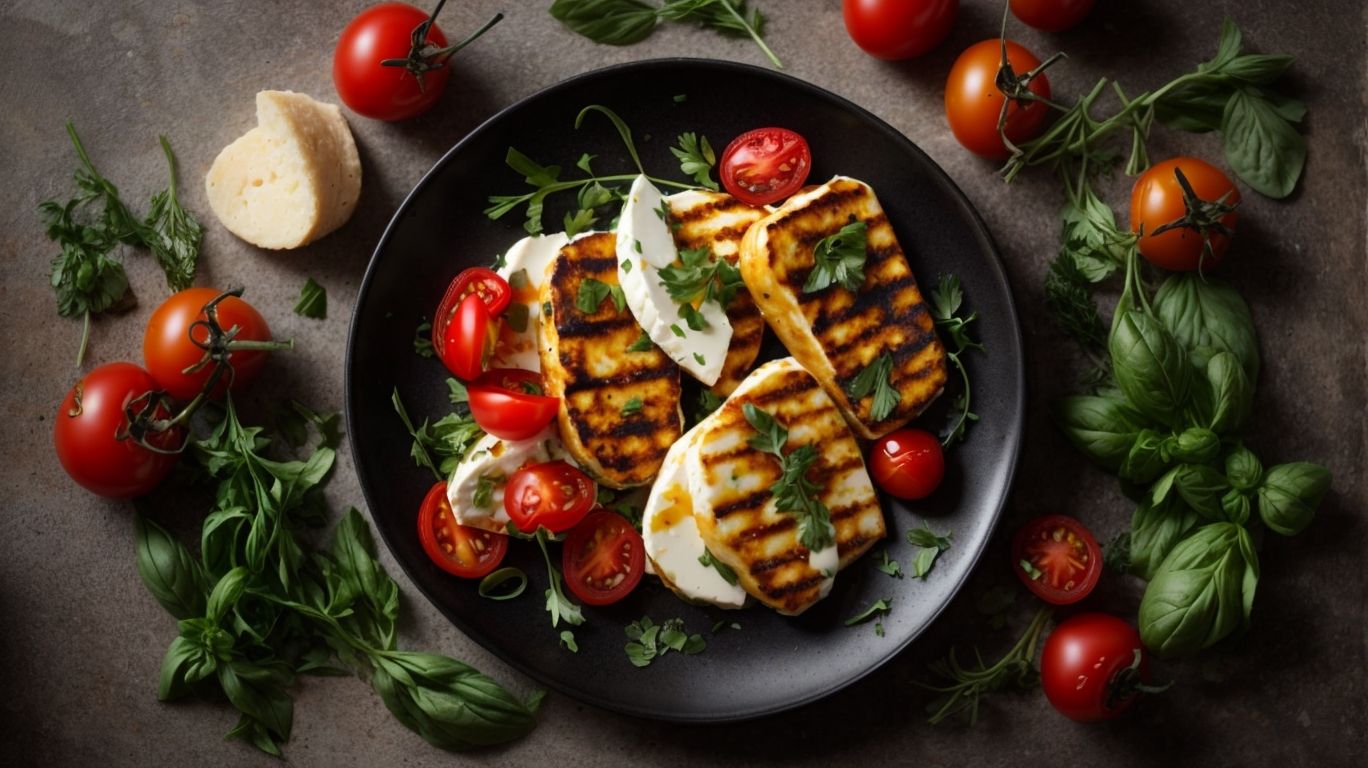
Credits: Poormet.Com – Russell Martinez
Serving halloumi cheese offers a canvas for both popular presentations and creative twists, allowing you to showcase this versatile cheese in all its delightful glory.
Traditional serving methods include grilling or frying halloumi cheese to achieve a delicious golden crust that encases a soft, slightly salty interior. Pairing it with fresh watermelon or skewering it with vegetables for a vibrant grilled kebab adds a refreshing touch to any meal. For a unique twist, try incorporating fried halloumi cheese cubes into a salad alongside sundried tomatoes and olives, topped with a drizzle of balsamic glaze for a mouthwatering Mediterranean flavour fusion.
What Are Some Popular Serving Ideas for Halloumi Cheese?
Elevate your dining experience with popular halloumi cheese serving ideas, combining crispy textures and versatile flavors for delectable side dishes that complement any meal.
One delicious way to enjoy halloumi cheese is by pan-frying or grilling it until golden brown and crispy on the outside while still gooey and soft on the inside. This contrast in textures adds a delightful element to any dish. Pair this crispy halloumi with fresh salad greens, ripe tomatoes, and a drizzle of balsamic glaze for a refreshing and satisfying appetizer or light lunch.
What Are Some Creative Ways to Serve Halloumi Cheese?
Unleash your culinary creativity by incorporating melted halloumi cheese into innovative dishes or savoring the savory goodness of BBQ and grilled halloumi variations for a flavorful dining experience.
One delightful way to use melted halloumi cheese is by drizzling it over a fresh bed of mixed greens and juicy grilled vegetables, creating a mouthwatering salad with a luxurious touch.
For a Mediterranean-inspired twist, skewer cubes of halloumi cheese alongside cherry tomatoes and zucchini, then grill to perfection, infusing the cheese with smoky flavors.
You can also elevate your brunch game by serving warm, gooey halloumi cheese on a bed of avocado toast, topped with a sprinkle of red pepper flakes for a spicy kick.
Frequently Asked Questions
How to Cook Halloumi?
Cooking halloumi is easy and can be done in a variety of ways. One of the most popular methods is grilling it, but you can also pan-fry, bake, or even deep fry it.
What is the best way to grill halloumi?
To grill halloumi, preheat your grill to medium-high heat and lightly oil the grates. Cut the halloumi into slices and place them directly on the grill. Cook for about 2-3 minutes on each side until golden brown with grill marks.
Can halloumi be cooked on the stovetop?
Yes, halloumi can be cooked on the stovetop. Simply heat a non-stick pan over medium heat and add a little bit of oil. Place the halloumi slices in the pan and cook for 2-3 minutes on each side until golden brown.
How long does it take to cook halloumi?
Depending on the cooking method, halloumi usually takes around 5-7 minutes to cook. Grilling and pan-frying are the quickest methods, while baking or deep frying may take longer.
Can halloumi be baked?
Yes, you can bake halloumi in the oven. Preheat your oven to 400°F and line a baking sheet with parchment paper. Place the halloumi slices on the sheet and bake for 10-12 minutes, flipping halfway through.
Are there any tips for cooking halloumi?
One tip for cooking halloumi is to make sure it is at room temperature before cooking. This will prevent it from becoming too hard and chewy. Also, avoid adding salt to the dish as halloumi is naturally salty.

